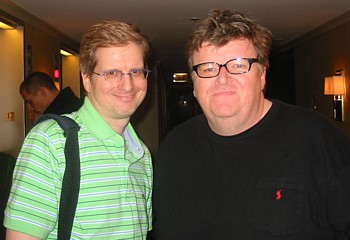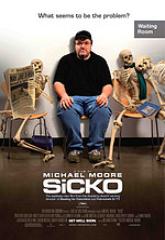
Close Encounters of the Celebrity Kind...
Michael Moore on Sicko
6-27-07 Windy City Times Interview
by Richard Knight, Jr.
6-27-07 Windy City Times Interview
by Richard Knight, Jr.
The activist filmmaker during a Chicago press appearance for the film, Sicko's alternate poster and immediately following the round
table interview with the author
table interview with the author
Filmmaker/activist Michael Moore is back with Sicko – the movie that has the health care shaking in its boots (and rightly so). Moore
has been touring the country promoting the film and speaking at rally’s (including one at Chicago’s Daley Plaza) – trying to incite
people to demand long overdue changes in the insurance industry. Windy City Times took part in a roundtable with the director.
Highlights:
Q: Whenever I see a film of yours I feel like it’s a call to action but what does one person do? What can I do walking out of the
theatre beside cast my vote or whatever?
MM: Well that’s important. Most people don’t vote most of the time, right? I’ll have things on my website, you’ll be able to get
involved and get behind a bill that’s in Congress – HR676.
Q: What does that cover?
MM: National health insurance. Create a single payer system. Organize locally. Nurses in towns all over America are organizing
this issue. Push for this. Push the politicians to pass legislation so that we can have the system they have in say, Canada or
whatever.
Q: How do nurses fit in the larger scheme of all this?
MM: Nurses are on the front lines of this problem. They see it everyday. They see the doctor after diagnosing what the patient
needs instead of just immediately giving what he or she needs they’ve got to call and make sure the insurance will cover it. That
doesn’t happen in a single other country in the western industrialized world. A doctor sees you need something, doctor goes and
gets it. That’s the way it should be.
Q: Americans by nature are impatient people. Is there a way to fast track this process?
MM: We have to start somewhere. I mean, how about this: we already have one of the largest socialized medicine systems in the
world – Medicare and Medicaid – okay, so we already cover tens of millions of people as it is. Then we have veterans, how many
millions of veterans do we have that are covered by the VA? That’s a socialized medicine system. So we have that. Why don’t we
take the next step and let’s cover the nine million kids. I mean what, who, liberal, conservative, whatever, who wouldn’t support the
fact that a kid should have the right to see a doctor and not have to worry about paying for it? There’s nine million more. You
know, maybe it will happen like that. I mean I hope it does. I hope it happens faster than that but I think it can expand and start
taking care of more and more people. Maybe the easy way to think about this is Medicare for all.
Q: We actually have ACT-UP to thank for faster access to experimental drugs and for really first putting the spotlight on the
insurance companies – these clever tactics they use to deny coverage.
MM: That’s true.
Q: A militant organization 20 years ago did this kind of thing and affected a lot of change. Would an organization like that have a
chance today?
MM: That’s a good question.
Q: Would those tactics work?
MM: Yes, I do believe that. I believe that’s exactly what we need. We need that kind of direct action and I think it would work.
Q: “ACT-UP. Fight Back. Fight AIDS.”
MM: For instance, what happened in the emergency in LA a couple of weeks ago where they were calling 911 because nobody was
helping the person that was dying?
Q: Right.
MM: I actually had a scene I was going to put in the movie encouraging people if the health insurance company is telling the doctor
they can’t treat you when you go to the hospital call 911 and report an attempted murder. Because this is attempted murder and in
fact, sometimes it is murder because they’re making the decision – as the doctor said in her testimony, “I signed ‘Denied’ and I
knew when I was doing that, that person was going to die.” It’s a form of murder and I would like to see criminal charges brought
against these people and they won’t do it until we the people stand up and demand it.
Q: It’s blood on their hands.
MM: Absolutely. You know when you think about 18,000 die each year simply because they don’t have health insurance – that’s six
9/11’s. Every year and the only reason they’re dead is because they didn’t have health insurance. It’s just criminal. We shouldn’t
allow it. I’m embarrassed by it.
Q: What was the most challenging part about putting Sicko together? What was the most surprisingly difficult thing you had to do?
MM: Reading those letters from the 25,000 people that were sent us. We read them all. I had my whole staff (10 people). It took
2 ½ months to read. That’s all we did was read email everyday and it was depressing. It was really tough.
Q: Did you consider some gay and lesbians because you know, we have special troubles getting our partners covered, I mean there’
s an actual level up of horrific stuff they can do. I’m just wondering if there was a person…
MM: No but let me say this though: I could have made a whole film about pharmaceutical companies, just a film about them. 25
years ago there were 30 pharmaceutical companies that were working on cures and vaccines. Today there’s five. Okay? Because
there’s no money in it. There’s a lot more money in dealing with HIV – in producing those drugs and the (drug) cocktail and the pills
and everything you’ll have to take for the rest of your life as opposed to actually working on the cure or the vaccine for it. Because
once you cure it you can’t sell anymore pills, right? And that’s not the way it used to be.
We used to have people like Jonas Salk who would find the polio vaccine or work on it. You know, we had scientists and doctors who
were committed to that and you take a guy like Jonas Salk, he wouldn’t patent it. He said, “This belongs to everybody.” The guy
that invented the kidney dialysis machine wouldn’t patent it. He said, “This belongs to everybody.” These guys could have been
billionaires but that wasn’t the way they thought. You know, it was a different time. People thought differently. Now it’s all about
the money. It’s all about the Haliburton’s of the drug industry.
The whole thing with HIV is this: it should’ve been a full frontal, full force effort from the get go and we all know the history of this.
It wasn’t, it was shoved aside, it was ignored, Reagan took seven years before he even said the word out of his eight year term. A
lot of people died that maybe didn’t have to die and now okay, there’s some money in it, so let’s not talk about trying to cure it, let’
s just try to maintain it. But no, I know…I mean, I’ll tell you, there’s so many things we could do.
Q: Where does your fire come from? What keeps you motivated? What keeps you pissed off all the time?
MM: Geez I wish I knew that. I don’t know. I was raised in an Irish Catholic home – maybe that says it all. I don’t know (LAUGHS).
has been touring the country promoting the film and speaking at rally’s (including one at Chicago’s Daley Plaza) – trying to incite
people to demand long overdue changes in the insurance industry. Windy City Times took part in a roundtable with the director.
Highlights:
Q: Whenever I see a film of yours I feel like it’s a call to action but what does one person do? What can I do walking out of the
theatre beside cast my vote or whatever?
MM: Well that’s important. Most people don’t vote most of the time, right? I’ll have things on my website, you’ll be able to get
involved and get behind a bill that’s in Congress – HR676.
Q: What does that cover?
MM: National health insurance. Create a single payer system. Organize locally. Nurses in towns all over America are organizing
this issue. Push for this. Push the politicians to pass legislation so that we can have the system they have in say, Canada or
whatever.
Q: How do nurses fit in the larger scheme of all this?
MM: Nurses are on the front lines of this problem. They see it everyday. They see the doctor after diagnosing what the patient
needs instead of just immediately giving what he or she needs they’ve got to call and make sure the insurance will cover it. That
doesn’t happen in a single other country in the western industrialized world. A doctor sees you need something, doctor goes and
gets it. That’s the way it should be.
Q: Americans by nature are impatient people. Is there a way to fast track this process?
MM: We have to start somewhere. I mean, how about this: we already have one of the largest socialized medicine systems in the
world – Medicare and Medicaid – okay, so we already cover tens of millions of people as it is. Then we have veterans, how many
millions of veterans do we have that are covered by the VA? That’s a socialized medicine system. So we have that. Why don’t we
take the next step and let’s cover the nine million kids. I mean what, who, liberal, conservative, whatever, who wouldn’t support the
fact that a kid should have the right to see a doctor and not have to worry about paying for it? There’s nine million more. You
know, maybe it will happen like that. I mean I hope it does. I hope it happens faster than that but I think it can expand and start
taking care of more and more people. Maybe the easy way to think about this is Medicare for all.
Q: We actually have ACT-UP to thank for faster access to experimental drugs and for really first putting the spotlight on the
insurance companies – these clever tactics they use to deny coverage.
MM: That’s true.
Q: A militant organization 20 years ago did this kind of thing and affected a lot of change. Would an organization like that have a
chance today?
MM: That’s a good question.
Q: Would those tactics work?
MM: Yes, I do believe that. I believe that’s exactly what we need. We need that kind of direct action and I think it would work.
Q: “ACT-UP. Fight Back. Fight AIDS.”
MM: For instance, what happened in the emergency in LA a couple of weeks ago where they were calling 911 because nobody was
helping the person that was dying?
Q: Right.
MM: I actually had a scene I was going to put in the movie encouraging people if the health insurance company is telling the doctor
they can’t treat you when you go to the hospital call 911 and report an attempted murder. Because this is attempted murder and in
fact, sometimes it is murder because they’re making the decision – as the doctor said in her testimony, “I signed ‘Denied’ and I
knew when I was doing that, that person was going to die.” It’s a form of murder and I would like to see criminal charges brought
against these people and they won’t do it until we the people stand up and demand it.
Q: It’s blood on their hands.
MM: Absolutely. You know when you think about 18,000 die each year simply because they don’t have health insurance – that’s six
9/11’s. Every year and the only reason they’re dead is because they didn’t have health insurance. It’s just criminal. We shouldn’t
allow it. I’m embarrassed by it.
Q: What was the most challenging part about putting Sicko together? What was the most surprisingly difficult thing you had to do?
MM: Reading those letters from the 25,000 people that were sent us. We read them all. I had my whole staff (10 people). It took
2 ½ months to read. That’s all we did was read email everyday and it was depressing. It was really tough.
Q: Did you consider some gay and lesbians because you know, we have special troubles getting our partners covered, I mean there’
s an actual level up of horrific stuff they can do. I’m just wondering if there was a person…
MM: No but let me say this though: I could have made a whole film about pharmaceutical companies, just a film about them. 25
years ago there were 30 pharmaceutical companies that were working on cures and vaccines. Today there’s five. Okay? Because
there’s no money in it. There’s a lot more money in dealing with HIV – in producing those drugs and the (drug) cocktail and the pills
and everything you’ll have to take for the rest of your life as opposed to actually working on the cure or the vaccine for it. Because
once you cure it you can’t sell anymore pills, right? And that’s not the way it used to be.
We used to have people like Jonas Salk who would find the polio vaccine or work on it. You know, we had scientists and doctors who
were committed to that and you take a guy like Jonas Salk, he wouldn’t patent it. He said, “This belongs to everybody.” The guy
that invented the kidney dialysis machine wouldn’t patent it. He said, “This belongs to everybody.” These guys could have been
billionaires but that wasn’t the way they thought. You know, it was a different time. People thought differently. Now it’s all about
the money. It’s all about the Haliburton’s of the drug industry.
The whole thing with HIV is this: it should’ve been a full frontal, full force effort from the get go and we all know the history of this.
It wasn’t, it was shoved aside, it was ignored, Reagan took seven years before he even said the word out of his eight year term. A
lot of people died that maybe didn’t have to die and now okay, there’s some money in it, so let’s not talk about trying to cure it, let’
s just try to maintain it. But no, I know…I mean, I’ll tell you, there’s so many things we could do.
Q: Where does your fire come from? What keeps you motivated? What keeps you pissed off all the time?
MM: Geez I wish I knew that. I don’t know. I was raised in an Irish Catholic home – maybe that says it all. I don’t know (LAUGHS).



